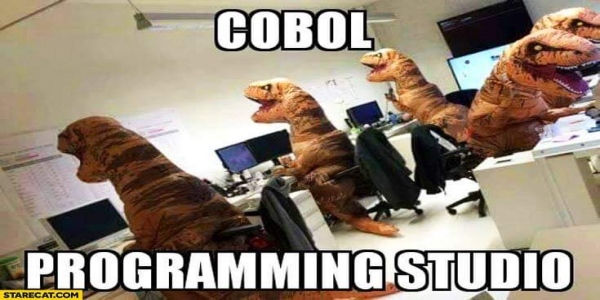Your "21st century banking" is sixty years old
And not just banking. But not for software.
There is one software language that controls all your money. A language that pretty much runs, all by itself, the cores of the worldwide financial systems. It cannot be replaced (not without great expense and risk, that is), and cannot be kept either, because the experts that really know it are dying out.

Banks all over the world are full of programs written in the COBOL language maybe forty or more years ago, but still running. They can do without it. That article I just linked has thousands of words of real world examples. The most crucial parts, that should convince you to read the whole piece to fully acknowledge the problem, are:
- COBOL programs will likely outlive many of the programmers who wrote it, because, in 2021, banks still “cannot function without them”
- ditto for healthcare, insurance companies, taxes, air travel and other “society-critical” services
When it came, COBOL “democratized coding” because it finally allowed companies to “take everyday people and train them to be useful COBOL programmers in a few months”. Today, the descendants of those programmers explain that COBOL makes it hard to innovate: “How can you tinker, bolt on new features, using an ancient language that energetic young coders have no interest in?"
What is innovation, anyway? WHERE is it?
The WealthSimple article makes a great job to explain how and why COBOL is still around. Read that piece, it’s fun. But the one-sentence version of that explanation is really short: COBOL is still there because it excels at what it must do: “They’ve had 50 years to get it right”.
Which brings to the conclusions that interest me the most, and should do the same with you. The article elaborates on how “this idea - that older code can not only be good, but in crucial ways superior to newer code - is at odds with a lot of Silicon Valley myth making”.
That’s true, but I suggest that the real lesson stays behind that: what is at odds here, and in countless other parts of society, is the very idea that innovation is, or must start from, in software code.
If you want to innovate banks for real, rather than just run them faster, you must start from laws, not code. From stuff like Open Bank, for example. Redesign finance and banks from the ground up, in Parliaments, first. After that, for all I know COBOL may still remain the preferred language of banks for decades, but it won’t matter. Because the banks will have to rewrite all their software anyway, to work better. Finally.
Who writes this, why, and how to help
I am Marco Fioretti, tech writer and aspiring polymath doing human-digital research and popularization.
I do it because YOUR civil rights and the quality of YOUR life depend every year more on how software is used AROUND you.
To this end, I have already shared more than a million words on this blog, without any paywall or user tracking, and am sharing the next million through a newsletter, also without any paywall.
The more direct support I get, the more I can continue to inform for free parents, teachers, decision makers, and everybody else who should know more stuff like this. You can support me with paid subscriptions to my newsletter, donations via PayPal (mfioretti@nexaima.net) or LiberaPay, or in any of the other ways listed here.THANKS for your support!